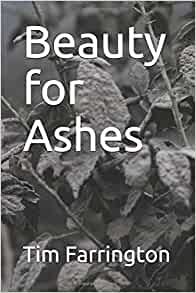
Beauty for Ashes



For those of you who know my work as a novelist and essayist on the dark night of the soul, I want to warn you ahead of purchase that this little book of poetry is a whole different can of worms. It is a sort of spiritual emergency chronicle in jottings, or a psychotic episode set in semi-poetic amber. Not for the faint of heart, in other words. So please, be warned, and consider your purchase very carefully. Thank you--- and best wishes--- Tim Farrington
p.s. For any of my DhO cronies who happen upon this book, on the other hand, I recommend that you skip my other books and START with this one.
In this unflinching look at depression and the human struggle to find hope in its midst, acclaimed author Tim Farrington writes with heartrending honesty of his lifelong struggle with the condition he calls "a hell of mercy." With both wry humor and poignancy, he unravels the profound connection between depression and the spiritual path, the infamous dark night of the soul made popular by mystic John of the Cross. While depression can be a heartbreaking time of isolation and lethargy, it can also provide powerful spiritual insights and healing times of surrender. When doctors prescribe medication, patients are often left feeling as if part of their very selves has been numbed in order to become what some might call "normal." Farrington wrestles with profound questions, such as: When is depression a part of your identity, and when does it hold you back from realizing your potential?
In the tradition of Darkness Visible and An Unquiet Mind, A Hell of Mercy is both a much needed companion for those walking this difficult terrain as well as a guide for anyone who has watched a loved one grapple with this inner emotional darkness.
Starred Review. The size of this little book—an expanded essay—belies its power. Acclaimed novelist Farrington (The Monk Downstairs) drills deep into his soul to ponder his own lifelong coexistence with depression. It is a meditation: the author lays bare his stream of thoughts, experience, details, a few pretty good jokes and many insights drawn from the consummate spiritual writer on interior darkness, John of the Cross. Farrington is well-read and draws from other writers and artists as well as the Spanish mystic in showing his way through the dark wood. He writes about his slow crawl to regular, functional life with beauty, cleverness, bone-breaking honesty and a deep, hard-won appreciation for the holy. Medications help; faith helps even more, and that costs a lot more than pharmaceuticals ever will. This book may be too unbearable for some who are depressed. For others, it could be a small voice in the darkness and a lifeline for those unsung sufferers living with someone who is depressed.
Copyright © Reed Business Information, a division of Reed Elsevier Inc. All rights reserved.
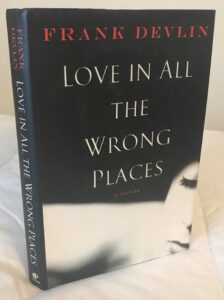
Farrington adopted the pseudonym Frank Devlin for his novel Love in All the Wrong Places, which features detective Rose Burke tracking down a husband-and-wife serial-killing team in San Francisco. Burke, whose marriage is in trouble, finds her midlife crisis complicated by pregnancy, the memory of her dead partner, and her new partner's growing attraction to her. Meanwhile, the killers, a depressed housemaker named Helen who beguiles men into having one-night stands, and her husband, who does the dirty work of disposing of the men afterward, prove worthy adversaries for Burke. Critics enjoyed Farrington's sympathetic portrayal of ambivalent female characters, who "are fascinating and somewhat disquieting to watch in action," wrote a critic for Publishers Weekly. A critic for Kirkus Reviews complimented Farrington's writing, saying that it "has the sensitivity to make you care about even his most unlovable characters."
https://www.encyclopedia.com/arts/educational-magazines/farrington-tim
Devlin introduces two intriguing, love-starved female characters—one a cop, the other a serial killer's wife—in this taut, stylishly written crime drama set in San Francisco. The wife is Helen, a bored-in-her-marriage, strikingly beautiful adulteress who lures single men into sexual liaisons, knowing full well that her husband, Jimmy, will kill her conquests. In pursuit of the killing team is Det. Rose Burke, a similarly complex woman, frustrated by her inattentive husband, unsettled by her pregnancy, still troubled by the death of her former partner. She's also a crafty, highly instinctual investigator who eventually keys in on tiny details in the string of murders and begins the arduous task of rooting out the killer. Devlin, pseudonym for novelist Tim Farrington (The Monk Downstairs ), casts neither woman in a particularly sympathetic light, yet they are fascinating and somewhat disquieting to watch in action. Both are drawn in fine, telling detail; Helen's crushing depression and tormented background and Burke's ambivalence toward career, marriage and domesticity are especially well rendered. The plot's tidy, convenient finale disappoints, but Devlin's fresh approach to the genre makes him a writer to watch in his new fictional persona.
Forecast: Fans of Farrington's quirky romances may not make the leap to alter ego Devlin's quirky crime fiction, but female thriller readers will appreciate Devlin's insight into the female psyche.
https://www.publishersweekly.com/978-0-399-15223-8
An angel has come for eight-year-old Alejandro Rodriguez, but he is the only one who can see her. For Michael Christopher, a former monk now working in the St. Luke's Mission hospice, the angel is not really the point. All Mike knows is that he is not going to make it to his step-daughter's gymnastic meet tonight, because this is almost certainly Alejandro's night to die, and it is his job to help the boy do that as mercifully as possible. The rest is in the hands of God. But God, it seems, has something else in mind. In the third book of the series including the bestselling The Monk Downstairs and The Monk Upstairs, The Lazarus Kid is a story of the depths of faith and love, of parents and children and marriage and grief, and of life, and death, and life - mysteriously and miraculously - again.
Book Review by Crissi Langwell:
I am a huge fan of Tim Farrington, having discovered The
Monk Downstairs a few years ago, followed by The Monk Upstairs, and then
concluding with every other book Farrington has ever written before re-reading
the Monk books again (and maybe again). So when I found out he had written
another book, I got it and started reading immediately.
The follow-up to the first two Monk books, The Lazarus Kid
does not disappoint. Farrington’s beautiful descriptive writing paints each
scene, placing a microscope on some points or aspects of certain scenes, and
panning way out for a broader view in others. Farrington has a way with
believability, offering details that breathe so much life into each event, it’s
almost as if you are right there inside the scene instead of just reading the
story from a page.
The characters have evolved since the first two books. Mike
is still contemplative and spiritual in both mind and mannerisms, but we now
see him in a deeper role as a father and stepfather – even if much of his
parenting is done at a distance due to chaos on the job. Rebecca is a better
mom than I am of a precocious teen, handling infuriating circumstances with clenched
fists and outward grace. And Mary Margaret is every bit the rebelling teen,
though I never once found her character to be cliche. Rather, I saw my own teen
daughter in her (hence, my awe at Rebecca’s skills of keeping a level head).
Of course, there’s so much more to the story, but I don’t
want to offer any spoilers at all. Just know that when you read anything by Tim
Farrington, you’ll never be disappointed. I can only hope that Mr. Farrington
has more books up his sleeve very soon.
https://books.blogs.pressdemocrat.com/10343/book-review-the-lazarus-kid-by-tim-farrington/
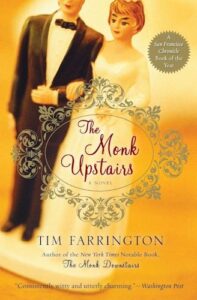
In this sprightly sequel to The Monk Downstairs (2002), Tim Farrington begins with the marriage of Mike, an ex-monk who works at McDonald's and prays a lot, and Rebecca, a divorced graphics designer with a seven-year-old daughter, Mary Martha, and a mother, Phoebe, who is still suffering from the repercussions of a debilitating stroke. The couple escapes San Francisco for a luxurious honeymoon in Hawaii where they savor a week of pure leisure and love-making. When they return, Mike begins a job search. The qualities which make him such a find in marriage don't matter at all in the work arena: his reserves of silence, tenderness, and unselfishness.
Mike's delight in being married to Rebecca is full and complete. He discovers that the monastery was a good training ground "for simply being decent with someone on a daily basis." They do bump heads with each other over religion since she is a lapsed Catholic and he still regularly goes to Mass. Rebecca isn't too thrilled when her daughter decides to go with him to church. Later, when he wants to have her baptized, Phoebe shares the news that she did an improvised baptism service in the bathtub years ago.
Mike finally gets a job at a hospice for homeless people. He has a heart-to-heart talk with Phoebe, who tells him she wants a beach party for her memorial service with kids, dogs, and lovers all cavorting together under a sky filled with balloons.
The Monk Upstairs is an enjoyable read with interesting and engaging characters who spur us to think more seriously about the manifold meanings of love, faith, and death.
https://www.spiritualityandpractice.com/book-reviews/view/16899/the-monk-upstairs
Rebecca Martin is a single mother with an apartment to rent
and a sense that she has used up her illusions. I had the romantic thing with
my first husband, thank you very much, she tells a hapless suitor. I'm
thirty-eight years old, and I've got a daughter learning to read and a job I
don't quite like. I don't need the violin music. But when the new tenant in her
in-law apartment turns out to be Michael Christopher, on the lam after twenty
years in a monastery and smack dab in the middle of a dark night of the soul,
Rebecca begins to suspect that she is not as thoroughly disillusioned as she
had thought.
Her daughter, Mary Martha, is delighted with the new
arrival, as is Rebecca's mother, Phoebe, a rollicking widow making a new life
for herself among the spiritual eccentrics of the coastal town of Bolinas. Even
Rebecca's best friend, Bonnie, once a confirmed cynic in matters of the heart,
urges Rebecca on. But none of them, Rebecca feels, understands how complicated
and dangerous love actually is.
As her unlikely friendship with the ex-monk grows toward
something deeper, and Michael wrestles with his despair while adjusting to a
second career flipping hamburgers at McDonald's, Rebecca struggles with her own
temptation to hope. But it is not until she is brought up short by the
realities of life and death that she begins to glimpse the real mystery of
love, and the unfathomable depths of faith.
Beautifully written and playfully engaging, this novel. is
about one man wrestling with his yearning for a life of contemplation and the
need for a life of action in the world. But it's Rebecca's spirit, as well as
her relationships with Mary Martha, Phoebe, her irresponsible surfer ex-husband
Rory -- and, of course, the monk downstairs -- that makes this story shine.
A joyful, wry, reflective exploration of San Francisco New Age life, circa the present. Akin to Armistead Maupin's Tales of the City, an eclectic collection of characters are rounded up to illustrate the prevailing zeitgeist of the city, centering on the rather indomitable figure of Marlowe. She and her lover Daa (Sheila Swenson before her transformation into a goddess worshipper) rent out rooms in their home to spiritual seekers--among them Jack Soft Hands, a massage therapist and member of the Institute of Health and Immortality, who has the candle-and-crystalfilled attic bedroom; and Marlowe's naive Virginian cousin Sheba, who rents the room that recently belonged to the much beloved Jackson, whose spirit has haunted Marlowe since his death from AIDS. The four housemates, and their large circle of friends, endure the tragedies of the physical world and thank their karmic good luck for life's little triumphs. First-novelist Farrington takes just the right tone here, being witty and honest about much of the silliness but never with a trace of condescension or malice. The buoyant plot takes a year to play out, following Marlowe's inexplicable indiscretion with Jack and her ensuing pregnancy. Sheba's esoteric journey is traced from her early, gullible interest in the immortality movement to the more sophisticated paths revealed by her guide Shakti, who reads everything from palms to tarot to past lives. When Sheba's boyfriend Victor arrives at the house to haul Sheba back home, everyone is surprised when the macho, beer- guzzling construction worker falls in love with Shakti, who in turn reciprocates. Though redemption and rejuvenation are always at hand, Farrington's blissful California is no happily-ever-after land: An honored guru knowingly spreads AIDS to his disciples, a gentle musician is killed, and true love splinters in a surprisingly unpredictable ending. A promising debut that offers a thoroughly enjoyable view of the idiosyncrasies of West Coast living.
Copyright ©1997, Kirkus Associates, LP. All rights reserved.
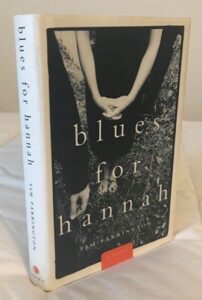
Fire imagery flares throughout Farrington's incandescent second novel (after The California Book of the Dead), in which narrator Jeremy Mason, a painter, mulls over the sudden death of his former lover, the blues-singing Hannah of the title, and journeys with their love-child to Nebraska to identify her body. This tale unfolds alongside the story of the passionate couple, of Jeremy's subsequent marriage to nurturing LeeAnne and of the remarkable, inextricable intertwining of the lives of the three adults. Spanning the mid-1970s to the present, the narrative captures the self-absorption, naive insights and fresh intimacies of college years, and the sometimes painful wisdom and liberating self-knowledge that come with growing up. Equally at home describing the artist's challenge in the face of a blank canvas or making up his own adult-contemporary version of the blues, Farrington's images and metaphors favor a purple palette (in both senses), but even so he leads us on a memorable, refreshingly lucid expedition across two decades and vast terrains of human connection: love, parenting, friendship and marriage.
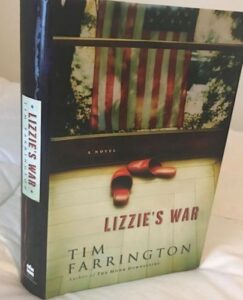
A moist-eyed story switches between the grim work of a Marine captain in Vietnam and the hand-wringing of his wife and children back in Virginia.
When she married Mike O’Reilly, Lizzie was an aspiring actress at Catholic University and intent on having a “deep, literate veteran” for a husband, one who was worldly and wrote novels. Instead, by August 1967, he’s stuck in Vietnam, making a career of the war, while Lizzie and their four children—she’s pregnant with the fifth—live in dread of the moment when the bad news will be delivered to her door in suburban Virginia. While Lizzie fills her days trying to distract her children with numbing domestic chores, and with making the dreaded visit to another Marine wife who has just heard the news of her husband’s death, Mike, overseas, is assigned a new company called Heartbreak Hotel and has to get in line “the usual USMC-issue array of maniacs, morons, stone-cold killers, and fuckups.”
In letters home, written from line-of-fire outposts like Dong Ha, Mike hints at the ghastly killings (the men who “bought it”) and the affecting camaraderie among the members of the company. Meanwhile, Lizzie sews her daughter’s bluebird uniform for Girl Scouts and befriends the lonely priest at St. Jude’s, Father Germaine, who is having his own spiritual crisis and finds solace in drinking with Lizzie and even flirting with her.
Mike is wounded, despite all his assurances that the war is safer than living in Nebraska, and, finally, Lizzie learns from an alarming news report on TV where her husband really is, Khe Sanh, South Vietnam, surrounded by Viet Cong: the parallel to Dien Bien Phu is eerie. Yet even with Mike wounded and Lizzie in a difficult labor, Farrington has woven such an idyllic family unit that nothing can undermine it.
https://www.kirkusreviews.com/book-reviews/tim-farrington/lizzies-war/
Eli Tremaine has had one great regret in his life. When she walks into his shop one day looking for a grave stone for her daughter, their long buried but unresolved past asserts itself amidst her grief and failing marriage.
Eli, a stone mason, is sure of only one thing, a fundamental truth he has learned working stone: You can spend days or weeks whittling a block down toward the essence of what you want from it and lose it all at the crucial moment by giving in to the temptation of the quick and easy stroke. The way to work with stone is the counterintuitive path of most resistance, the patient grinding at the stone's most unyielding core. It is the slowest way to work, but it is the only way to keep the truth in the stone and not leave it on the floor of the shop.
In this wonderfully contemplative novel, the author of The Monk Downstairs, Tim Farrington, once again uses his formidable powers of prose and his keen knowledge of the human condition to fashion this story of how we fall and get up again. Using the slow work of carving tombstones as a metaphor, he tells the story of two people who have loved each other for most of their lives, but the weight of grief and regret may be too much to overcome the weight of their shared past - and their heartfelt, electric present.
Edison McDaniels’s wonderfully evocative narration brings a further authenticity to the words and is a delight for the listener.